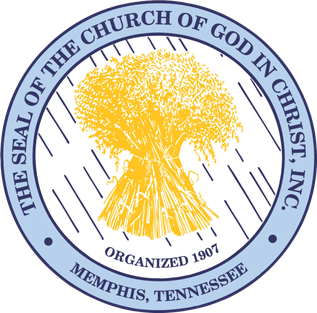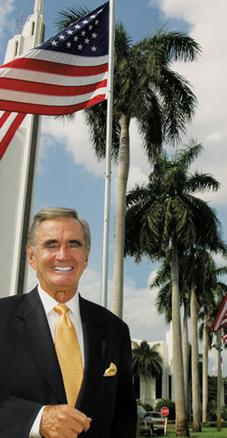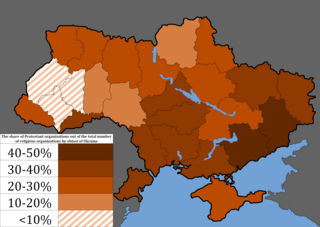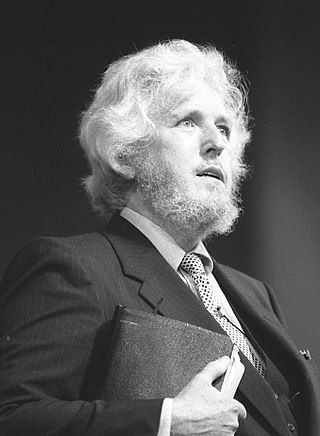Related Research Articles

The Church of God in Christ (COGIC) is an international Holiness–Pentecostal Christian denomination, and the largest Pentecostal denomination in the United States. Although an international and multi-ethnic religious organization, it has a predominantly African American membership based within the United States. The international headquarters is in Memphis, Tennessee. The current Presiding Bishop is Bishop John Drew Sheard Sr., who is the Senior Pastor of the Greater Emmanuel Institutional Church of God in Christ of Detroit, Michigan. He was elected as the denomination's leader on March 27, 2021.

The Christian Reformed Church in North America is a Protestant Calvinist Christian denomination in the United States and Canada. Having roots in the Dutch Reformed Church of the Netherlands, the Christian Reformed Church was founded by Dutch immigrants in 1857 and is theologically Calvinist.

Richard Duane Warren is an American Baptist evangelical Christian pastor and author. He is the founder of Saddleback Church, an evangelical Baptist megachurch in Lake Forest, California.
The Brownsville Revival was a widely reported Christian revival within the Pentecostal movement that began on Father's Day June 18, 1995, at Brownsville Assembly of God in Pensacola, Florida. Characteristics of the Brownsville Revival movement, as with other Christian religious revivals, included acts of repentance by parishioners and a call to holiness, inspired by the manifestation of the Holy Spirit. Some of the occurrences in this revival fit the description of moments of religious ecstasy. More than four million people are reported to have attended the revival meetings from its beginnings in 1995 to around 2000.

Holy Communion, also known as the Eucharist and the Lord's Supper, is a Christian rite that is considered a sacrament in most churches. The elements of the rite are sacramental bread and wine.
The Neo-charismaticmovement is a movement within evangelical Protestant Christianity that is composed of a diverse range of independent churches and organizations that emphasize the current availability of gifts of the Holy Spirit, such as speaking in tongues and faith healing. The Neo-charismatic movement is considered to be the "third wave" of the Charismatic Christian tradition which began with Pentecostalism, and was furthered by the Charismatic movement. As a result of the growth of postdenominational and independent charismatic groups, Neo-charismatics are now believed to be more numerous than the first and second wave categories. As of 2002, some 19,000 denominations or groups, with approximately 295 million individual adherents, were identified as Neo-charismatic.

Dennis James Kennedy was an American pastor, evangelist, Christian broadcaster, and author. He was the senior pastor of Coral Ridge Presbyterian Church in Fort Lauderdale, Florida, from 1960 until his death in 2007. Kennedy also founded Evangelism Explosion International, Coral Ridge Ministries, the Westminster Academy in Fort Lauderdale, the Knox Theological Seminary, radio station WAFG-FM, and the Center for Reclaiming America for Christ, a socially conservative political group.
Ecclesiastical polity is the operational and governance structure of a church or of a Christian denomination. It also denotes the ministerial structure of a church and the authority relationships between churches. Polity relates closely to ecclesiology, the study of doctrine and theology relating to church organization.
Wolf Peregrin Joachim Wolfensberger, Ph.D. (1934–2011) was a German-American academic who influenced disability policy and practice through his development of North American Normalization and social role valorization (SRV). SRV extended the work of his colleague Bengt Nirje in Europe on the normalization of people with disabilities. He later extended his approach in a radical anti-deathmaking direction: he spoke about the Nazi death camps and their targeting of disabled people, and contemporary practices which contribute to deathmaking.

The Apostolic Faith Mission of South Africa (AFM) is a classical Pentecostal Christian denomination in South Africa. With 1.2 million adherents, it is South Africa's largest Pentecostal church and the fifth largest religious grouping in South Africa representing 7.6 percent of the population. Dr. Isak Burger has led the AFM as president since 1996 when the white and black branches of the church were united. It is a member of the Apostolic Faith Mission International, a fellowship of 23 AFM national churches. It is also a member of the South African Council of Churches.

The Assemblies of God USA (AG), officially the General Council of the Assemblies of God, is a Pentecostal Christian denomination in the United States. The Assemblies of God is the U.S. branch of the World Assemblies of God Fellowship, the world's largest Pentecostal body. With a constituency of 3,041,957 in 2011, the Assemblies of God was the ninth largest Christian denomination and the second largest Pentecostal denomination in the United States, growing to 3,295,923 in 2019. Since then, its adherents have declined to 2,928,143 in 2022.

Protestants in Ukraine number about 600,000 to 700,000 (2007), about 2% of the total population. Nearly all traditional Protestant denominations are represented in the country. According to Christianity Today magazine, Ukraine has become not just the "Bible Belt" of Eastern Europe, but a "hub of evangelical church life, education, and missions". At present, the country is a key supplier of missionaries and a center of evangelical training and press printing for all the countries of the former Soviet Union, where the legal environment is not so favourable.

Coral Ridge Presbyterian Church is a Christian megachurch within the Presbyterian Church in America located in Fort Lauderdale, Florida. It was founded in 1960 by D. James Kennedy (1930–2007), who served as the church's senior pastor until shortly before his death.
The Assyrian Pentecostal Church, is a Reformed Eastern Christian denomination that began in ethnically Assyrian villages across the Urmia region in northwestern Iran, spreading to the Assyrians living in the adjacent cities, and from there to indigenous Assyrian communities in the Assyrian Homeland, northern Iraq, southeastern Turkey and northeastern Syria.

William Eugene Scott was an American minister and teacher who served for almost 50 years as a pastor and broadcaster in Los Angeles, California. He pastored the Faith Center and Wescott Christian Center and held weekly Sunday services at the Los Angeles University Cathedral. Scott was known for his flamboyant persona when he presented late-night evangelistic television broadcasts.
Pentecostalism is a renewal movement within Protestant Christianity that places special emphasis on a direct personal relationship with God and experience of God through the baptism with the Holy Spirit. For Christians, this event commemorates the descent of the Holy Spirit upon the followers of Jesus Christ, as described in the second chapter of the Book of Acts. Pentecostalism was established in Kerala, India at the start of the 20th century.

Pentecostalism in Australia is a large and growing Christian movement. Pentecostalism is a renewal movement within Protestant Christianity that places special emphasis on a direct personal experience of God through baptism with the Holy Spirit. It emerged from 19th century precursors between 1870 and 1910, taking denominational form from c. 1927. From the early 1930s, Pentecostal denominations multiplied, and there are now several dozen, the largest of which relate to one another through conferences and organisations such as the Australian Pentecostal Ministers Fellowship. The Australian Christian Churches, formerly known as the Australian Assemblies of God, is the oldest and longest lasting Pentecostal organisation in Australia. The AOG/ACC is also the largest Pentecostal organisation in Australia with over 300,000 members in 2018. Until 2018, Hillsong Church was one of 10 megachurches in Australia associated with the ACC that have at least 2,000 members weekly. According to the church, over 100,000 people attend services each week at the church or one of its 80 affiliated churches located worldwide.
The intersection of disability and religion concerns the manner in which disabled people are treated within religious communities, the religious texts of those religions, or the general input from religious discourse on matters relating to disability. Studies on the relationship between religion and disability vary widely, with some postulating the existence of ableism and others viewing religion as a primary medium through which to assist disabled people. Religious exhortation often prompts adherents to treat people with disabilities with deference, however when the disability constitutes a mental illness such an approach may be slanted with an acknowledgement of the latter's naivete. In religions with an eschatological belief in divine judgment, there are often traditions promulgating an exemption from judgement in the afterlife for mentally disabled people, as well as for children who die before reaching maturity due to both lacking an understanding of their actions in a manner analogous to the insanity defense. Regarding the rationale behind God's creation of disabled people, some religions maintain that their contrast with the non-disabled permits the non-disabled to reflect and God to subsequently assess the level of gratitude shown by each individual for their health.
Protestant liturgy or Evangelical liturgy is a pattern for worship used by a Protestant congregation or denomination on a regular basis. The term liturgy comes from Greek and means "public work". Liturgy is especially important in the Historical Protestant churches, both mainline and evangelical, while Baptist, Pentecostal, and nondenominational churches tend to be very flexible and in some cases have no liturgy at all. It often but not exclusively occurs on Sunday.
References
- ↑ Meacham, Pat. "The Special Gathering," Special Education Today, Winter 2007-08, pg 12,13.
- ↑ Kreig, Peg. "People With Mental Handicaps Make Up a Special Church," Presbyterian Survey, 1986 October.
- ↑ Stimson, Richard. "How Will We Minister?" Networks for Those With Specialized Ministry; 1991, January.
- ↑ Stimson, Richard. "Exploitation is Not Necessary," Networks for Those With Specialized Ministry; 1994, April.
- ↑ Burgess, Daniel W. "A Special Church for a Special People," Pentecostal Evangel, 1987 15 March, pp 8-10.
- ↑ Fleming, Bill. "Called to an Invisible Society," Christianity Today, 1996.
- ↑ Webb-Mitchell, Brett, PhD. "The De-institutionalization of Specialized Ministries: The Importance of the Church Being the Church" Journal of Religion of Disability and Rehabilitation, Vol.1(1) 1994, pg 49, Haworth Press, Inc.